Britain Continues To Stumble Toward Brexit
As Brexit hangs by a thread in the United Kingdom, the European Union makes clear that renegotiation of the agreement that has been reached is a non-starter.
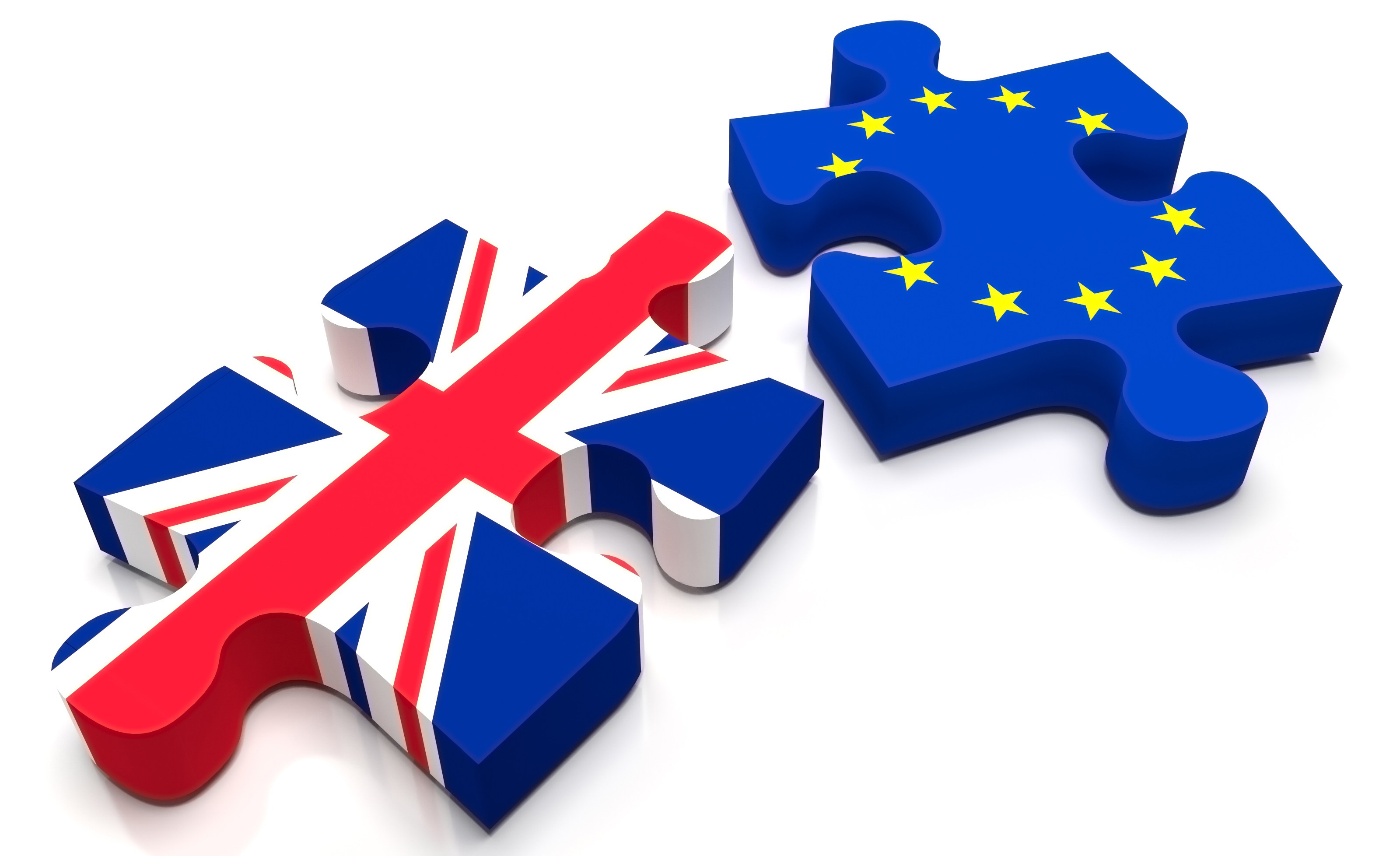
Even while the British government enters a crisis moment as Prime Minister Theresa May works to finalize the deal to break the United Kingdom’s ties to the European Union, the negotiators for the E.U. are making clear that renegotiating what’s already been agreed to is for the most part not an option:
Brussels is on edge, but it has no intention of going back to the Brexit drawing board.
Chief Brexit negotiator Michel Barnier told a meeting of EU27 ambassadors Friday morning that whatever political “difficulties” Theresa May is experiencing in London, the bloc has a “duty” to stand firm on its key Brexit red lines, according to EU diplomats present.
For her part, May is standing firm on the deal in the face of a gale of criticism and is intent on pushing the deal to a vote in the House of Commons. But if political opponents in her own party succeed in forcing her to seek a better deal, there is no sign that any of the EU27 red lines will change.
We cannot “compromise” or engage in “cherry-picking” or “bargaining,” Barnier told ambassadors, referring to requests to reopen the draft deal that was agreed by the British Cabinet on Wednesday. He added that he expects “difficult negotiations” ahead.
Barnier also expressed a desire to help the British government in its efforts to ratify the text in a vote of MPs. And he said that there could be room for movement on the EU side in specific areas, such as enhanced cooperation on phytosanitary regulations and so-called technical barriers to trade. It is a moment not for triumphalism, he said, but for “encouragement.”
The chief negotiator’s presentation at the more than two-hour meeting reflects a dilemma for Brussels. While EU countries want to help May get the deal through parliament, there is a reluctance at such a late stage to radically unpick the agreement — despite threats to May’s leadership and a series of ministerial resignations over the deal.
Diplomats say that some tweaks might still be possible if they could make the difference between the deal succeeding or crashing, but the kind of radical overhaul proposed by Brexiteers such as former Brexit Secretary David Davis is simply not on the table. There is “no question” of that, German Chancellor Angela Merkel said Thursday.
“If we renegotiate something it could be on very small details,” said a senior EU diplomat “[but] it will not be on the main issues.”
“Europeans are not scared, but very cautious, and everybody hopes the deal will be approved,” he added, saying that the first major challenge will be the tight timescale to consider the details of the deal before a hastily arranged EU leaders’ summit on November 25.
“Some of us will need to consult our MPs on the text, and make the necessary democratic deliberations in our countries,” the diplomat added.
“All eyes are on London,” said another EU diplomat. “We see there are some turbulences.” Asked about the mood in Brussels, the diplomat said: “It’s a feeling of relief that at least there’s a text on the table.” A third diplomat added: “Everyone is committed to getting the ball over the line.”
(…)
The diplomat cited the EU’s acceptance of an all-U.K. customs backstop — as an insurance measure to prevent a hard border in Northern Ireland — and the decision to kick negotiations about fisheries access into the transition period that will immediately follow Brexit day in March next year. “It’s not clear, and it will affect millions of jobs,” said the senior EU diplomat. “There’s nothing precise.”
Barnier was briefing ambassadors on the state of ongoing talks about the political declaration — the document that will accompany the 585-page Withdrawal Agreement. Only a cursory seven-page outline of that was published on Wednesday evening and the chief negotiator indicated that several issues are still in play.
On security matters including participation in EU agencies such as Europol and Eurojust he said, according to two EU diplomats, that the U.K. does still “not accept” the full ramifications of not being an EU member country. But Barnier added that both sides share the aim of close cooperation. And on mechanisms to ensure there is a level playing field between British and EU businesses after Brexit, EU ambassadors expressed reservations in the discussion following Barnier’s briefing.
“Any regulatory gap is a serious issue,” said the senior diplomat, adding that the text “isn’t clear” on environmental and social measures. “The consequences are important because it could enhance any regulatory gap on major issues.” One country’s representative is also “worried” that the text offers too much to the U.K. on services.
As May continues to try to save the Brexit plan that she presented to her cabinet, notwithstanding the fact that it clearly seems to be destabilizing her hold on power and could cause her to lose crucial support from the Democratic Unionist Party (DUP), these statements from the E.U.’s Brexit minister make clear that the European Union is unlikely to agree to significant changes to the deal that the Brits have put forward. This likely does not mean that there wouldn’t be the possibility of some agreement on minor changes to the proposal in order to get the deal through the House of Commons, but it should send a strong signal to May and the rest of the British political elite that, at least as far as the European Union is concerned, the broad outlines of the final deal have been set and that any effort to try to turn back the clock and create major changes to what has been negotiated is not going to be an option.
This is of particular concern because of what it means for the future of May’s government. As you may recall,the snap election that May called in April of last year resulted in the conservatives losing seats in the House of Commons, forcing them to enter into an agreement with Northern Ireland’s Democratic Unionist Party under which the DUP would vote with the Tories on essential bills and on any vote of confidence in the government in exchange for Tory concessions to the DUP on certain policy issues of concern to them. One of the main areas of concern with respect to Brexit is the DUP demand that Northern Ireland would not be treated any differently from the rest of the United Kingdom when it came to Brexit. However, in order to maintain the open border between Northern Ireland and the Republic of Ireland that has been crucial to keeping the peace in that region for more than 20 years now, May’s Brexit plan would keep certain E.U. regulations in effect in Northern Ireland even though they would no longer apply elsewhere in the United Kingdom. This led the DUP to vote with the opposition Labour Party on a recent finance bill that would ordinarily have fallen within the category of those bills that it had pledged to support under the 2017 agreement with the Tories. While the DUP has characterized this as a ‘warning shot’ to the May Government rather than a sign that the “confidence and supply” agreement between the parties was dead. Nonetheless, this latest development is being seen by some observers as yet another sign that May’s Government is barely surviving at this point and that any future crisis could bring it all crashing down even as Brexit reaches the breaking point.

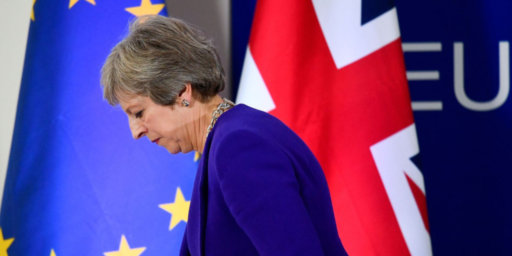
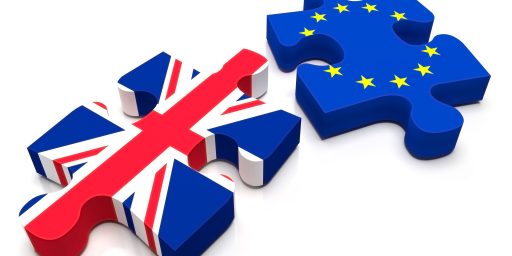
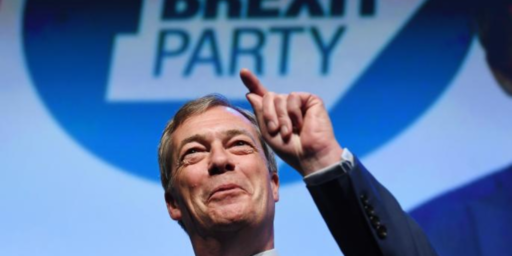

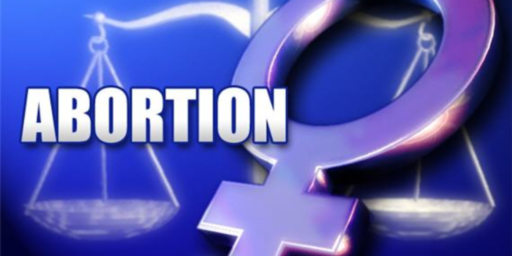
One of the reasons the EU isn’t very interested in negotiating any large changes is because there’s no indication of what would satisfy them, except “give me everything I want”
The Brits really are acting like a bunch of spoiled brats
@Grumpy realist:
The Brits are acting as if they are still as important as they were when they were in the EU and closely linked to the US. They are evidently unaware that between leaving the EU and seeing the Special Relationship severely devalued by Idjit Trump, they are no longer Great Britain, connective tissue between two trillion dollar economies, but just another moderately-productive country of no particular distinction. They stand alone as Little Britain, no more significant than Italy or Brazil in a world dominated by the US, China, Japan and the EU.
The British people made a bad mistake, led on and lied to by the Tories, with the feckless acquiescence of the diseased remnants of a Labor Party that can’t seem to cope with its own anti-Semitism let alone formulate a plan.
From Don’t blame the Irish: the Brexit chaos is all about England :
It seems that if Britain is intent on hurting itself, the EU doesn’t see it as their place to stop it.
It’s worse.
May knows full well that reopening negotiation is not an option; arguments for this come from three sources
– Some remarkably dumb Brexiteers who have remained in the Cabinet and are unwilling (or just too stupid) to see reality, and want to keep some of their “Brexit-cred” intact to placate the activists.
– The Labour Party, some of whom (i.e. Corbyn) might be dense enough to believe it’s possible, but for most of the leadership it’s just a tactic to maximise pressure while cynically avoiding being honest with Leave voters, but in fact (mostly) aim at a May-like deal or Remain.
– The ERG (the hardcore Brexit Conservatives “party within a party”) and their backers, who are also using “renegotiate” as a pressure tactic, but are either too purblind to realise the UK has minimal leverage, or who actually WANT a No Deal exit, and are proposing renegotiating intending failure.
With the DUP locked into “NO” mode, the ERG can use them as patsies.
(And if the DUP believe they’ll get much thanks from the ERG for it, they’re sadly deluded.)
On the other hand, the ERG attempt to mount a Party vote of confidence in May seems to have failed; so much for claims of them having “more than fifty” MP’s signed up. (Snigger)
And the probability is still fair that if even if the ERG can get the 48 votes to trigger, Conservative MP’s would back May.
But May’s deal can’t pass the Commons unless she can gather enough votes from the Opposition parties to offset the ERG and however many Conservatives rebel.
Looks iffy.
And whole loads of scary decision trees from that point.
Looks like I’m living in interesting times.
(Can I go back to the 1990’s now please. I liked the 1990’s)
@JohnSF: Yes–the loons over at the Telegraph are floundering around attempting to explain the super-duper-special strategy the Torys are carrying out, a.k.a. eleventy-twelve dimensional chess. Anything rather than admit the reality, which is that most of them are too scared of the aftereffects to actually rebel. Or like BoJo, it’s easier and simpler to sit on the sides as an overly well-paid commentator in the Telegraph blustering about How Horrible Theresa May is rather than do anything.
Doug, thanks for posting the Politico link. I’ve been frustrated that almost everyone keeps talking about this as a “deal” when everything I’ve seen indicates it is just extending the negotiations by 21 months while Britain obeys virtually all previous EU rules but gives up their voting rights in that body. The Politico piece makes it clear that this is in fact correct.
I guess they are resolving one issue in a very back door method: creating a hard border between Northern Ireland and the rest of the UK. By saying “this will take effect unless we come up with a better solution” May is gambling that she can string the loyalists (who she depends on to stay in power) along for long enough that when they realize nothing else is coming it will be too late.
@MarkedMan:
What’s a little pathetic is that this is probably the best Brexit they can hope for, kicking the can down the road, a couple years at a time, forever.
@grumpy realist:
Ah, Boris.
Nietszche’s “magnificent blond beast avidly prowling round”
To paraphrase Marx, “first as tragedy, then as bloody annoying.”
May he soon sod off to richly deserved obscurity, alleviated by contempt.
@MarkedMan:
That could be considered as a trial version of the Norway option or rather EFTA membership. Norway is not a member of the EU, has no voting rights, has to follow virtually all EU rules, but does get access to the European Single Market. It also doesn’t have to pay as much to the EU as if it was a full member.
But the UK seems to believe that it can cherry pick among the four freedoms in the Single Market and get to restrict freedom of movement for labor. The EU will never accept that.
What’s so infuriating is that there was an end result that could have been amendable to almost everybody (Flexit) but the Brexiters decided that bluffing would get them everything, and Great Britain is obviously a “large enough market” that the German car manufacturers (and the Dutch cheese manufacturers and the Italian Prosecco producers) would of course put pressure on their governments to Do Whatever Britain Wanted. The fact that indulging the U.K. would light the fire under a runaway process where everyone else would want to run away from the EU because they could still get all the benefits and didn’t have to have any of the responsibilities was conveniently ignored–or even worse, not cared about.
Basically, the rest of the EU has been expected to set itself on fire to keep the U.K. warm. The EU isn’t having any of that, and is telling the U.K. to sod off.
@grumpy realist:
Yes. As a Remainer, I’d have been happy enough with an EEA/EFTA based “Flexit” approach as “good enough”. Out of the EU enough to satisfy Leavers, but avoiding the damage to UK trade, industry and finance of a sudden radical breach, and recognising that country was roughly evenly split Leave vs Remain.
But May decided to prioritize ending Freedom of Movement, due to her read of the politics of the Leave vote.
Which ruled out a Single Market membership offer from the EU, and started the ever diminishing circles of trying to avoid the economic consequences of that choice.
If she had not taken that course, had been honest with the country (and herself) about the options, and not triggered Article 50 before determining strategy, it could have been done.
IMHO even the free movement issue could have been finessed by simply using the powers we already had but had been to damn sloppy to implement re. FoM i.e. three month limit on stay without means of support, health insurance rules etc.
Also, May ruling out European Court of Justice (and by implication EFTA Court)authority, when nobody bar the obsessives really cared; it was always the European Court of Human Rights that was the cause of headlines, and that is NOT an EU institution, it’s a Council of Europe one, which we are and will remain a member of.
I still idly wonder if May got the two mixed up; or at least hoped other people will.
It may me a wry chuckle is if/when we get an adverse ECHR decision a few years from now, and the screech of “Eh? Yer wot?” comes from the Leavers.
Who selects the leaders of the EU? Do the citizens get to select them?
@Tyrell:
There is an elected parliament that nominally appoints the commission, but the true decisions are made by meetings of the government heads.
@JohnSF: I never understood the Brexiter obsession with not allowing the ECJ to have any jurisdiction whatsoever. For a bunch of people who brag incessantly about How Great Common Law Is, you’d think they’d understand jurisdiction, choice of forum clauses, and choice of law clauses. Bluntly–the EU is bigger.
Do the Brexiters really think that any trade agreement that gets signed with the US is going to be able to insist only U.K. law courts be used in any dispute? Ho ho ho….
@Tyrell:
Short answer:
The leaders of the EU are the leaders of its member states in Council.
Longer:
The Council determines policy for the States acting as a Union within the limitations of the Treaties.
The Council may meet as heads of government, or as ministers for specific policy areas e.g. agriculture; or there is the General Affairs Council of the permanent ambassadors.
There are many areas in which the Union has no standing and are reserved to the States
e.g. defence/military, alliances, criminal law and policing, taxation (within certain constraints re. completion law), health, welfare, education, external immigration. etc.
The Commission has powers over the areas of EU responsibility: (if memory serves) agriculture, fisheries, external commerce, competition policy, international transport, free movement of goods, persons, capital and services, and related goods standards and regulations.
The States also cooperate in areas outside sole EU authority, on Treaty limited but sometimes very significant ways, known as “areas of shared competence”: e.g. on environmental issues, energy, security concerns, infrastructure projects, R&D, consumer protection, visas, asylum, overseas associates and development, etc. etc.
There is also one area which is sui generis: the Euro and its European Central Bank, which is overseen by a the subset of states who are Eurozone members. Messy and complicated.
Execution of Council policy is the responsibility of the Commission; the President of the Commissioner is appointed by the Council (despite the Parliament trying to wedge its foot in the door); the Commissioners are chosen by the President of the Commission and the States.
Oversight is shared by Parliament and Council.
There is also a full time President of the Council, in effect a standing secretary general; and the Presidency (confused yet?) which rotates between the States on a six-monthly basis.
A rough analogy from American history: take the Continental Congress, greatly expand its commercial remit but strip it of its military/foreign policy role, and add a partial monetary union and central bank.
@grumpy realist:
Yes. The Brexiteer understanding of how international trade negotiations and dispute resolution works is naïve, to put it very mildly.
They are in for a nasty shock when they come up against the US, China or India, let alone the EU, in hardball trade neg. mode.
“So, very nice to meet you Mr. Dover. Or would you prefer Ben?”
If only it wasn’t my country this is happening to it might be worth buying popcorn.
And the idiots of the ERG and their dodgy related network of thinktanks (with all their Cambridge Analytica/Mercer linkages) think they’re embarking on some wonderful libertarian “creative destruction” transatlantic fantasy voyage. Bloody fools.
I’ve said this before on this topic, but it bears repeating.
We (the US) will have resolved our Trump problem in 2020.
The UK will bear the fruits of Brexit for decades. A “Leave” vote was very, very, very foolish. An American voting for a dude like Trump is really foolish and that will have consequences for four years. I can withstand four years.
Brexit “Leave” is basically forever, and on someone else’s terms.
@JohnSF: And then we’ve got Mr. Dominic Raab (a.k.a. “Midair Bacon”) who, wow, just discovered “how important Dover is” a few weeks ago.
One despairs.
(Oh yes–the “Singapore on the Thames” gambit. Totally ignoring (as everyone seems to do) that one reason Singapore is so useful to world-wide business is that it’s one of the very few countries that has a double taxation treaty with Taiwan so if you are a multinational corp that wants to invest in Taiwan the easiest is to go in via Singapore. I wanna see the U.K. try to duplicate that….)
@grumpy realist:
Singapore. Pfft.
Well, at least they didn’t go for North Korea.
Two interesting bits of reading I’ve found recently: Anthony Barnett on the motivations of the Brexiteer leadership
(A left perspective; I’d disagree with considerable parts, but I think he is correct about the worldview of at least part of the leadership).
Also two speeches by Sir Ivan Rogers, the former UK PermRep in Brussels, and a very astute insider, (sacked by May for being a realist) on the EU/UK relationship.
@de stijl: Johnson for president. Dwayne Johnson.